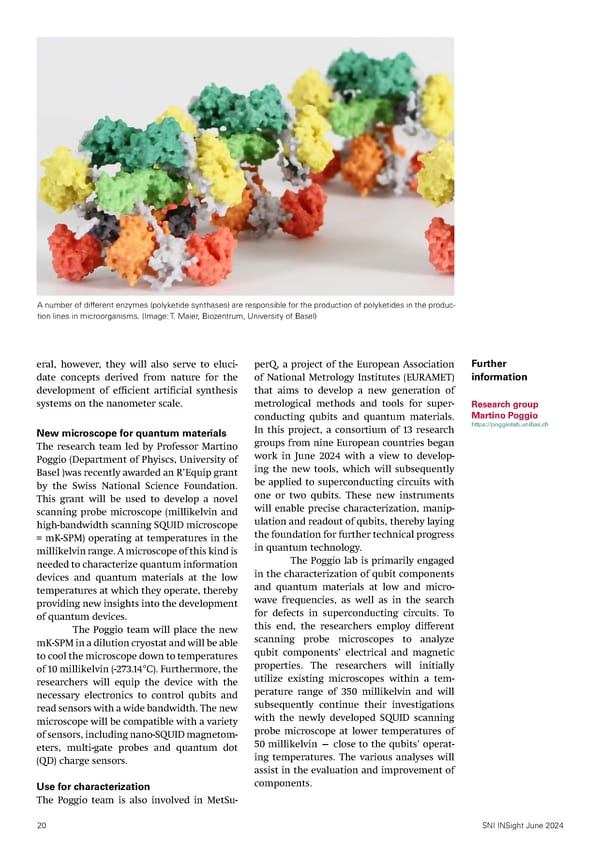A number of different enzymes (polyketide synthases) are responsible for the production of polyketides in the produc- tion lines in microorganisms. (Image: T. Maier, Biozentrum, University of Basel) eral, however, they will also serve to eluci- perQ, a project of the European Association Further date concepts derived from nature for the of National Metrology Institutes (EURAMET) information development of e昀케cient arti昀椀cial synthesis that aims to develop a new generation of systems on the nanometer scale. metrological methods and tools for super- Research group conducting qubits and quantum materials. Martino Poggio In this project, a consortium of 13 research https://poggiolab.unibas.ch New microscope for quantum materials The research team led by Professor Martino groups from nine European countries began Poggio (Department of Phyiscs, University of work in June 2024 with a view to develop- Basel )was recently awarded an R’Equip grant ing the new tools, which will subsequently by the Swiss National Science Foundation. be applied to superconducting circuits with This grant will be used to develop a novel one or two qubits. These new instruments scanning probe microscope (millikelvin and will enable precise characterization, manip- high-bandwidth scanning SQUID microscope ulation and readout of qubits, thereby laying = mK-SPM) operating at temperatures in the the foundation for further technical progress millikelvin range. A microscope of this kind is in quantum technology. needed to characterize quantum information The Poggio lab is primarily engaged devices and quantum materials at the low in the characterization of qubit components temperatures at which they operate, thereby and quantum materials at low and micro- providing new insights into the development wave frequencies, as well as in the search of quantum devices. for defects in superconducting circuits. To The Poggio team will place the new this end, the researchers employ di昀昀erent mK-SPM in a dilution cryostat and will be able scanning probe microscopes to analyze to cool the microscope down to temperatures qubit components’ electrical and magnetic of 10 millikelvin (-273.14°C). Furthermore, the properties. The researchers will initially researchers will equip the device with the utilize existing microscopes within a tem- necessary electronics to control qubits and perature range of 350 millikelvin and will read sensors with a wide bandwidth. The new subsequently continue their investigations microscope will be compatible with a variety with the newly developed SQUID scanning of sensors, including nano-SQUID magnetom- probe microscope at lower temperatures of eters, multi-gate probes and quantum dot 50 millikelvin — close to the qubits’ operat- (QD) charge sensors. ing temperatures. The various analyses will assist in the evaluation and improvement of Use for characterization components. The Poggio team is also involved in MetSu- 20 SNI INSight June 2024
 SNI INSight June 2024 Page 19 Page 21
SNI INSight June 2024 Page 19 Page 21